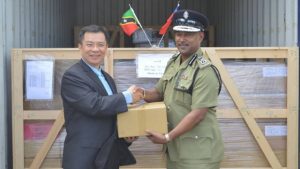
Ambassador Chiou (left) presented the spare parts to Commissioner Queeley
A shipping container with vehicle spare parts from the Republic of China (Taiwan) was presented to the Royal St. Christopher and Nevis Police Force (RSCNPF) on Wednesday (March 01) during a brief ceremony at Hobson Enterprises, Bird Rock.
The parts will be used to service police cruisers that were donated by the government of the ROC to the local police force a few years ago. Commissioner of Police, Ian Queeley, said the 2014 donation of 12 Luxgen vehicles in total, provided relief for the law enforcement body as it sought to increase mobility, particularly in rural communities and hot spots. However, getting replacement parts for the cars were proving a bit of a challenge given the rapidly changing technology landscape in Taiwan.
“So once again we approached our friends from the embassy who kindly consented,” Commissioner Queeley stated, referring to the locally based Taiwanese Embassy. “A list was prepared of all the requisite parts, in significant quantities, so that we will be able to keep the vehicles serviced and running for an extended period.”
Permanent Secretary in the Ministry of National Security, Osmond Petty, also thanked the ROC government through its representative His Excellency George Gow Wei Chiou, the resident ambassador.
“The cost of the spare parts is in excess of US $60,000 so it is a very sizeable investment and we want to thank the ambassador and ask him to express our appreciation to the government and people of Taiwan for assisting us yet again,” Mr. Petty said.
Ambassador Chiou said supporting the police was important as they keep the nation and the population safe. He highlighted the ongoing assistance also being provided in the Closed Circuit Television project that will see surveillance increased around Basseterre, St. Kitts, and Charlestown, Nevis, as well as in St. Peter’s, Shadwell, Frigate Bay and Conaree. VIVOTEK INC, a leading global firm in surveillance based in Taiwan, is working with local law enforcement and a private security company on the project. The RSCNPF recently issued a press release stating that six persons participated in an extensive one week training session on the effective and efficient use of Closed Circuit Television (CCTV). The “real world” training was conducted in Taiwan.
